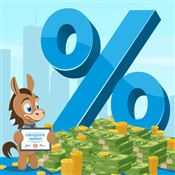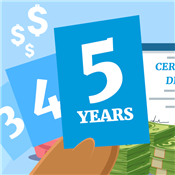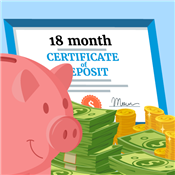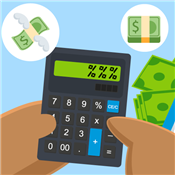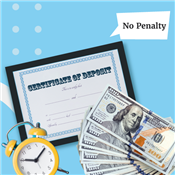Best 4 Year CD Rates for April 2024
Ad Disclosure: This article contains references to products from our partners. We may receive compensation if you apply or shop through links in our content. This compensation may impact how and where products appear on this site. You help support CreditDonkey by using our links.
Is it worth opening a 4-year CD? Check out today's highest 4-year CD rates.
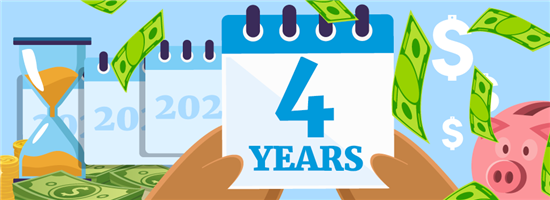 |
Is it better to keep your money in a 4-year CD than a regular savings account? It depends.
A 4-year CD can help you lock in a good interest rate for a long time. But, be ready to park your cash for a solid 48 months.
Interested? See who offers the best 4-year CD rates, and figure out whether you should get a CD or not.
What is a 4-Year CD?
A 4-year CD or a 48-month CD is a savings account where you need to deposit a fixed amount for 4 years. You get a fixed APY that will apply until the term ends in exchange. CDs usually offer higher rates compared to a simple savings account.
Some high-yield savings accounts might offer better rates. But if you're looking for stable interest earnings long term, a 4-year CD might do the trick.
One of the highest rates on a 4-year CD is Freedom Credit Union (PA):
How Do 4-Year CDs Work?
When you invest in a CD, you usually can't access your funds until it reaches maturity. So, when you open a 4-year CD, you are committing to keeping your money locked up for that entire period.
This is why banks give you higher rates on CDs than regular savings accounts where you have easy access. Plus, if you withdraw early, you might face penalties that can go up to 180 days' worth of interest.
Who is a 4-Year CD Best For?
A 4-year CD is suitable for folks who can park their money for 4 years. Also if interest rate changes bother you, a fixed-rate CD can give you some peace of mind.
But if you will need to move your funds around often, consider other options like a high-yield savings account instead.
Typically, 4-year CD rates move with the Federal Funds rate changes. But, there is no guarantee that CD rates will go up or down. Following the movement of the Fed Funds rate is a good way to estimate if CD rates will increase.
How Much Interest Does a 4-Year CD Earn?
If you had $10,000 in a 4-year CD with an APY of 3% then you'd get $1,255 at maturity. How much you earn on a 4-year CD depends a lot on what your APY is and the amount in your CD.
Here's a table to illustrate how the APY and amount impact what you earn on a 4-year CD.
| Rate | $2,000 | $5,000 | $10,000 |
|---|---|---|---|
| 0.50% | $2,040 | $5,101 | $10,202 |
| 1.00% | $2,081 | $5,203 | $10,406 |
| 1.50% | $2,123 | $5,307 | $10,614 |
| 2.00% | $2,165 | $5,412 | $10,824 |
| 2.50% | $2,208 | $5,519 | $11,038 |
| 3.00% | $2,251 | $5,628 | $11,255 |
| 3.50% | $2,295 | $5,738 | $11,475 |
| 4.00% | $2,340 | $5,849 | $11,699 |
| 4.50% | $2,385 | $5,963 | $11,925 |
| 5.00% | $2,431 | $6,078 | $12,155 |
| 5.50% | $2,478 | $6,194 | $12,388 |
| 6.00% | $2,525 | $6,312 | $12,625 |
Here's a simple CD calculator you can use to check how much you can earn on a CD.
Is a 4-Year CD Worth It?
Whether getting a 4-year CD is worth it will depend on your financial goals. A CD can provide passive income to steadily grow your funds over time. So it's worth a try for those who can afford to park their money for at least 4 years.
However, if you'll need your money for things like emergencies or daily necessities, CDs may not be ideal due to restricted access and potential early withdrawal penalties.
In general, CDs are most beneficial when interest rates are high and you're comfortable with locking away your funds.
High 4-year CD rates may be offered by online banks and credit unions. Online banks can give great rates because of their lower overhead costs. Credit unions can offer the same as they are non-profit institutions.
Can You Lose Money on a 4-Year CD?
Usually, you won't lose money on a 4-year CD. CDs are federally insured for up to $250,000 for banks or credit unions that are FDIC or NCUA members. That means your deposits are covered in case your bank or credit union fails.
But you can still lose some of your potential earnings to early withdrawal penalties. The fees can eat into your interest earnings and even dip into your initial balance if you withdraw before maturity.
Yes. Because CDs are typically federally insured, they are one of the safest investments available.
Pros and Cons of a 4-Year CD
Pros
- Lock in high interest rates.
You can get high, fixed interest rates during the 4-year CD term to lessen your worries about market changes for the long term. - Low-risk.
4-year CDs are generally safe, low-risk investments. Funds deposited in your CD are federally insured and returns are guaranteed.
Cons
- Early withdrawal penalties.
Your money is expected to be locked in for 48 months. You may need to pay early withdrawal penalties if you need to close your CD early. - Miss out on better rates.
Interest rates fluctuate a lot in the next 4 years. If you're already locked in a 4-year CD with a lower APY, you may miss out on higher earnings.
Like most CDs, you cannot withdraw from your 4-year CD without paying penalties. If you'll need to withdraw early, consider no-penalty CDs to avoid fees.
How to Choose the Best 4-Year CD
If you're planning to open a 4-year CD, go through these three questions to decide on an offer:
- What is the APY?
The best CD rates may not be offered on 4-year CDs. But in general, you'd want the highest APY to maximize your earnings on any CD. Search for the best rates available to you before you commit. - What is the minimum deposit required?
Some CDs have minimum deposit requirements. If you cannot park a large amount for at least 4 years, make sure you choose a CD with little to no deposit requirements. - How much is the early withdrawal penalty?
Penalties for 4-year CDs can range from 120 to 180 days worth of interest. If closing your CD early is a possibility, look for one with lower penalties. Better yet, find a no-penalty CD to avoid paying any fees.
How to Open a 4-Year CD
If you have your information and money ready, opening a 4-year CD can be easy. Some CDs can be opened online quickly too. Here's how to open a 4-year CD:
- Confirm where to open the CD.
Read the CD's disclosures about where and how you can open it. Some CDs are only available online or at physical bank branches. - Complete the form and review the terms.
Fill out the application form by providing the necessary information. Make sure to review the terms and conditions to cover details like interest payments, maturity date, and early withdrawal penalties. - Submit and fund your CD.
Once submitted, you can fund your CD through various methods, such as online transfers, wires, or check deposits.
If you're not sure how to open a CD with a specific bank or credit union, it is best to reach out to a representative to guide you.
The rule of thumb is to get a CD when interest rates are at their highest. CD rates typically move with the Fed Funds rate. Thus, following their trend can help you decide when to get a 4-year CD.
What Happens at the End of a 4-year CD?
Your bank or credit union usually will notify you if your 4-year CD is about to mature. Before it does, decide if you want to:
- Automatically renew the CD.
- Renew the CD with a different amount, term, or both.
- Withdraw all your funds and close the CD.
Make sure to inform your bank before or during the grace period after your CD matures. Otherwise, the CD might renew and early withdrawal penalties will already apply.
Most CDs will have early withdrawal penalties, so if you need to close your CD before it matures, be prepared to pay the penalties.
Alternatives to 4-year CDs
In case a 4-year CD is not suitable for your goals, here are alternatives you can consider:
High-Yield Savings Account
If you need easy access to your money, consider a high-yield savings account. You can add or take out money whenever you want, making it great for short-term goals, emergencies, or just saving up. But, do note that interest rates can change, unlike CDs.
- Raisin:
High-Yield Savings Account - Up to $1,500 Bonus - CIT Bank Platinum Savings:
$300 Bonus - Axos ONE:
Earn up to 4.31% APY - Current Savings:
Up to 4.00% bonus - Valley National Bank:
High-Yield Savings Account - 3.95% APY
Money Market Accounts
A money market account, similar to a savings account, allows you easy access to your money. Some even come with a debit card, ATM access, and check-writing abilities. However, the rate may also be lower and can change during a 4-year term.
- UFB Portfolio Money Market:
Earn up to 3.26% APY
Treasury Securities
If you want to lock in rates long term like 4-year CDs, check out Treasury bills, notes, and bonds. These are backed in full faith by the government, making them safe and reliable long-term investments.
Traditional or Roth IRA accounts
If you are preparing for retirement, you may as well look at Individual Retirement Accounts (IRA). These are tax-advantaged accounts that help you save for retirement. For one, earnings and withdrawals for Roth IRAs are tax-free.
Unfortunately, yes. Interest earnings of $10 or more per year are considered income and are taxable at state and federal levels. A bank usually sends you a 1099-INT form and you have to report it when you file your taxes.[1]
Shorter-term CDs
If 4 years is too long to commit, you can go for short-term CDs. Some shorter terms might even have higher rates. You can also build a CD ladder that stretches 4 years with short-term CDs.
- Community Bank & Trust (GA):
6-Month CD - 4.60% APY - Liberty Federal Credit Union:
6-Month CD - 4.50% APY - HAB Bank:
3-Month CD - 4.50% APY - Leader Bank:
6-Month CD - 4.50% APY - Pelican State Credit Union:
12-Month CD - 4.49% APY
4-year CD FAQs
Is a 4-year CD better than a savings account?
If you need easy access to your money, choose a savings account. If not, consider a 4-year CD to lock in potentially higher rates. Both are FDIC-insured, as long as your bank or credit union is an FDIC or NCUA member.
Which is better: CD or IRA?
CDs offer reliable, low-risk earnings, while IRAs provide tax benefits and the potential for higher returns with increased risk. Your preference depends on your risk tolerance and financial situation.
Is there a CD that pays monthly?
Yes, some CDs may pay interest every month. The frequency can vary depending on the CD. But if you want to maximize your interest earnings, try not to withdraw your interest to get the full effect of compound interest.
Bottom Line
If you need to preserve your money and get passive income long-term, a 4-year CD could be a good option. However, whether or not you should open one depends on your financial goals and situation.
But before you decide to open a 4-year CD, be sure that you can commit to the long term. Otherwise, early withdrawal penalties might be a problem. Try more accessible accounts like a high-yield savings account instead.
References
- ^ IRS. Topic No. 403, Interest Received, Retrieved 02/14/2024
Rue Atanacio is a research analyst at CreditDonkey, a bank comparison and reviews website. Write to Rue Atanacio at rue.atanacio@creditdonkey.com. Follow us on Twitter and Facebook for our latest posts.
Note: This website is made possible through financial relationships with some of the products and services mentioned on this site. We may receive compensation if you shop through links in our content. You do not have to use our links, but you help support CreditDonkey if you do.
|
|
| ||||||
|
|
|
